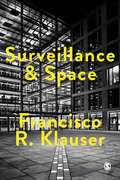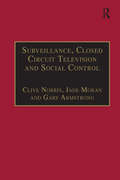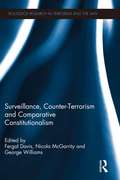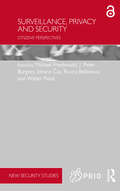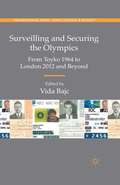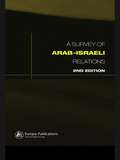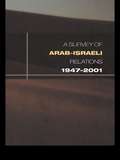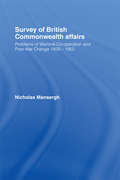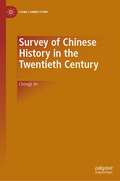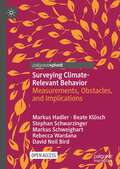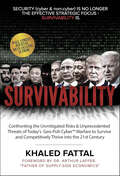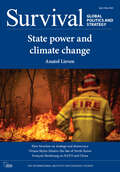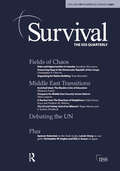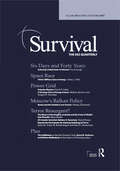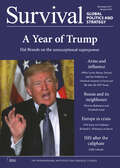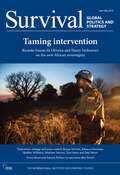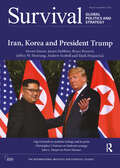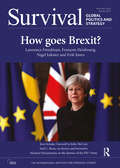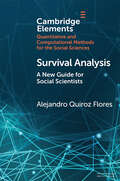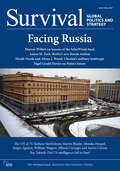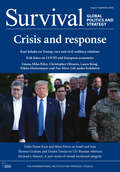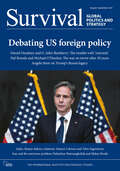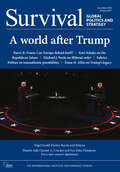- Table View
- List View
Surveillance and Space (Society and Space)
by Francisco KlauserThe digital age is also a surveillance age. Today, computerized systems protect and manage our everyday life; the increasing number of surveillance cameras in public places, the computerized loyalty systems of the retail sector, geo-localized smart-phone applications, or smart traffic and navigation systems. Surveillance is nothing fundamentally new, and yet more and more questions are being asked: Who monitors whom, and how and why? How do surveillance techniques affect socio-spatial practices and relationships? How do they shape the fabrics of our cities, our mobilities, the spaces of the everyday? And what are the implications in terms of border control and the exercise of political power? Surveillance and Space responds to these modern questions by exploring the complex and varied interactions between surveillance and space. In doing so, the book also advances a programmatic reflection on the very possibility of a ‘political geography of surveillance’.
Surveillance and Surveillance Detection: A CIA Insider's Guide
by John KiriakouHave you ever thought you were being followed or watched? Have you ever needed to follow or observe someone and not be seen?In the world of espionage, surveillance and surveillance detection are a way of life. It is the job of every CIA operations officer to make sure he or she is not under surveillance—that is, being followed to the commission of an &“operational act.&” It is also the job of every CIA operations officer to surveil his own targets, whether they are terrorists or terrorist suspects, foreign intelligence officers, hostile actors, or even sometimes his own agents for vetting purposes. In everyday life, many people from all walks of life need to know how to perform similar operations. Whether avoiding a stalker, checking up on an unfaithful partner, or just securing one&’s own privacy, a working knowledge of modern surveillance and surveillance detection techniques is a critical skill to possess. And there is nobody better to teach that skill than someone trained by the CIA.From former CIA counterterrorism officer John C. Kiriakou, Surveillance and Surveillance Detection: A CIA Insider's Guide takes you through the CIA's surveillance and surveillance detection program. It will teach you to apply CIA surveillance techniques to your own everyday life. You&’ll learn how to stay safe, to ensure your privacy, and to keep the honest people honest—the CIA way.
Surveillance and Terror in Post-9/11 British and American Television
by Darcie Rives-EastThis interdisciplinary study examines how state surveillance has preoccupied British and American television series in the twenty years since 9/11. Surveillance and Terror in Post-9/11 British and American Television illuminates how the U.S. and U.K., bound by an historical, cultural, and television partnership, have broadcast numerous programs centred on three state surveillance apparatuses tasked with protecting us from terrorism and criminal activity: the prison, the police, and the national intelligence agency. Drawing from a range of case studies, such as Sherlock, Orange is the New Black and The Night Manager, this book discusses how television allows viewers, writers, and producers to articulate fears about an increased erosion of privacy and civil liberties following 9/11, while simultaneously expressing a desire for a preventative mechanism that can stop such events occurring in the future. However, these concerns and desires are not new; encompassing surveillance narratives both past and present, this book demonstrates how television today builds on earlier narratives about panoptic power to construct our present understanding of government surveillance.
Surveillance, Closed Circuit Television and Social Control
by Clive Norris Jade MoranThe rise of CCTV camera surveillance in Britain has been dramatic. Practically every major city now boasts a CCTV system aimed at, among other things, preventing, detecting and reducing the fear of crime. Increasingly these developments are mirrored in villages, shopping malls, residential estates, transport systems, schools and hospitals throughout the country. In short, for the majority of citizens it is now impossible to avoid being monitored and recorded as we move through public space. Surveillance, CCTV and Social Control represents the first systematic attempt to account for this phenomenon. It brings together leading researchers from the fields of anthropology, criminology, evaluation, geography, sociology and urban planning to explore the development, impact and implications of CCTV surveillance. Accordingly attention is directed to a number of key questions. How does CCTV fit with the trends of late modernity? Does CCTV reduce crime or merely shift it elsewhere? How should CCTV be evaluated? What is the significance of CCTV for women's safety? How adequate is the regulation of CCTV? In the light of recent technological developments what is the future of CCTV surveillance?
Surveillance, Counter-Terrorism and Comparative Constitutionalism (Routledge Research in Terrorism and the Law)
by George Williams Nicola McGarrity Fergal DavisThe decade after 11 September 2001 saw the enactment of counter-terrorism laws around the world. These laws challenged assumptions about public institutions, human rights and constitutional law. Those challenges are particularly apparent in the context of the increased surveillance powers granted to many law enforcement and intelligence agencies. This book brings together leading legal scholars in the field of counter-terrorism and constitutional law, and focuses their attention on the issue of surveillance. The breadth of topics covered in this collection include: the growth and diversification of mechanisms of mass surveillance, the challenges that technological developments pose for constitutionalism, new actors in the surveillance state (such as local communities and private organisations), the use of surveillance material as evidence in court, and the effectiveness of constitutional and other forms of review of surveillance powers. The book brings a strong legal focus to the debate surrounding surveillance and counter-terrorism, and draws important conclusions about the constitutional implications of the expansion of surveillance powers after 9/11.
Surveillance, Privacy and Security: Citizens’ Perspectives (PRIO New Security Studies)
by J. Peter Burgess Michael Friedewald Johann Čas Rocco Bellanova Walter PeisslThis volume examines the relationship between privacy, surveillance and security, and the alleged privacy–security trade-off, focusing on the citizen’s perspective. Recent revelations of mass surveillance programmes clearly demonstrate the ever-increasing capabilities of surveillance technologies. The lack of serious reactions to these activities shows that the political will to implement them appears to be an unbroken trend. The resulting move into a surveillance society is, however, contested for many reasons. Are the resulting infringements of privacy and other human rights compatible with democratic societies? Is security necessarily depending on surveillance? Are there alternative ways to frame security? Is it possible to gain in security by giving up civil liberties, or is it even necessary to do so, and do citizens adopt this trade-off? This volume contributes to a better and deeper understanding of the relation between privacy, surveillance and security, comprising in-depth investigations and studies of the common narrative that more security can only come at the expense of sacrifice of privacy. The book combines theoretical research with a wide range of empirical studies focusing on the citizen’s perspective. It presents empirical research exploring factors and criteria relevant for the assessment of surveillance technologies. The book also deals with the governance of surveillance technologies. New approaches and instruments for the regulation of security technologies and measures are presented, and recommendations for security policies in line with ethics and fundamental rights are discussed. This book will be of much interest to students of surveillance studies, critical security studies, intelligence studies, EU politics and IR in general. A PDF version of this book is available for free in open access via www.tandfebooks.com. It has been made available under a Creative Commons Attribution-Non Commercial 3.0 license.
Surveilling and Securing the Olympics: From Tokyo 1964 to London 2012 and Beyond (Transnational Crime, Crime Control and Security)
by Vida BajcThis book analyses the relationship between the Olympic Games, with its ethos of openness and collectivism, and the security concerns and surveillance technologies that are becoming increasingly prevalent in the organisation of public events.
Survey of Arab-Israeli Relations
by Cathy Hartley Paul CossaliImpartial documentation and background information fundamental to the understanding of Arab-Israeli relations. Key Features:* covers in detail the years since the first Arab-Israeli war and the statehood of Israel, in 1947-48, to the most recent developments in relations between Israel, the emerging Palestinian political entities and the Arab States* a chronology provides an at-a-glance record of events from 1947 until the present day* a 'Documents on Palestine' section gives essential background to the various ongoing areas of dispute* profiles of prominent political figures * a bibliography section* a series of maps illustrating the history of Arab-Israeli conflict and recent peace initiatives and settlement issues.
Survey of Arab-Israeli Relations 1947-2001
by David LeaImpartial documentation and background information fundamental to the understanding of Arab-Israeli relations. Key Features: * Covers in detail the years since the first Arab-Israeli war and the statehood of Israel, in 1947-48, to the most recent developments in relations between Israel, the emerging Palestinian political entities and the Arab States * A chronology provides an at-a-glance record of events from 1947-2001 * A Documents on Palestine section gives essential background to the various ongoing areas of dispute * Profiles of prominent political figures * A bibliography section * A series of maps illustrating the history of Arab-Israeli conflict and recent peace initiatives and settlement issues.
Survey of British Commonwealth Affairs: Problems of Wartime Cooperation and Post-War Change 1939-1952
by Nicholas ManserghFirst Published in 1968. Routledge is an imprint of Taylor & Francis, an informa company.
Survey of Chinese History in the Twentieth Century (China Connections)
by Chongji JinThis book presents a panoramic history of the Chinese nation spanning the twentieth century, with the great rejuvenation of the Chinese nation as its central theme. In their unwavering pursuit of national independence, universal emancipation, and a country of power and shared prosperity, the Chinese people undertook an arduous journey that saw China fundamentally transformed by such historic events and experiences as the overthrow of the imperial system in the 1911 Revolution, the founding of the People’s Republic of China, reform and opening up, and the construction of socialism with Chinese characteristics. Massive in scope, meticulously documented, and rigorously written, this volume has few rivals among general histories of China in the twentieth century.
Surveying Climate-Relevant Behavior: Measurements, Obstacles, and Implications
by Markus Hadler Beate Klösch Stephan Schwarzinger Markus Schweighart Rebecca Wardana David Neil BirdThis open access book discusses the contribution of sociology and survey research to climate research. The authors address the questions of which behaviors are of climate relevance, who is engaging in these behaviors, in which contexts do these behaviors occur, and which individual perceptions and values are related to them. Utilizing survey research, the book focuses on the measurement of climate-relevant behaviors with population surveys and develops an instrument that allows a valid estimate of an individual’s GHG emissions with a few core items. While the development of these instruments was based on surveys and qualitative interviews conducted in Austria, the instruments were subsequently tested in a set of 31 European countries, revealing the international relevance of such research. The book also concludes with a brief consideration of the effects of the COVID-19 crisis on environmental attitudes, situating the project globally.
Survivability: Confronting the Unmitigated Risks & Unprecedented Threats of Today’s Geo-Poli-Cyber™ Warfare to Survive and Competitively Thrive into the 21st Century
by Khaled FattalToday, safeguarding nation-states, organizations, and citizens has less to do with security (cyber and non-cyber) but has everything to do with Survivability.We are now in the 'Era of the Unprecedented': since 2010, Geo-Poli-Cyber™ warfare has been increasing in intensity. The motivation of its perpetrators is often driven by political, ideological, ‘religious’ and extremist objectives, rather than financial gain. Many top decision makers and citizens are unaware of this reality or the implications it has on their sovereignties, businesses, lives and livelihoods, and most do not know how to mitigate it. This trend has seen governments and businesses constantly breached by high-impact cyberattacks, confirming the ineptitude of best in class cyber security strategies, solutions, policies and procedures. Yet, they continue implementing what they know is failing and ineffective.The 2020 pandemic revealed a fundamental flaw in many Western democratic nations; their failure to appropriately prepare for a threat they knew was coming and the cost of this in human lives. This pandemic has shed light on the weaknesses of the current international order and economic, political, legal and democratic models and structures that enable it. It has also called into question the capacity of existing cyber security protocols and designs to protect nations, companies and citizens. The question remains: are governments ready for cyber terrorism, election meddling, fake news and the malicious use of artificial intelligence and quantum computing? How about them all happening at the same time? Survivability provides potential answers to this and other pressing concerns.
Survival (April-May 2020): State Power and Climate Change
by Anatol LievenSurvival, the IISS’s bimonthly journal, challenges conventional wisdom and brings fresh, often controversial, perspectives on strategic issues of the moment. In this issue: Anatol Lieven argues that strong and legitimate states remain central to any efforts to limit climate change and mitigate diseases such as coronavirus, and to maintain Western democracy Oriana Skylar Mastro warns that hereditary autocratic regimes such as North Korea’s are prone to sudden collapse, something for which policymakers should be prepared Shelby Butt and Daniel Byman contend that Russia’s attempts to undermine the West include supporting white-supremacist and other far-right groups And eight more thought-provoking pieces, as well as our regular book reviews and noteworthy column
Survival 49.2: Survival 49.2 Summer 2007
by Steven Simon John Buck Jeffrey Mazo Dana Allin Bruno Tertrais Ellena JamieFirst published in 2007. This book explores the complicity of democratic states from the global North in state terrorism in the global South.
Survival 49.3: Survival 49.3 Autumn 2007
by Yezid SayighSurvival, the Institute of Strategic Studies' quarterly journal, is a leading forum for analysis and debate of international and strategic affairs. With a diverse range of authors, eight to ten articles per issue, plus thoughtful reviews and review essays, Survival is scholarly in depth while vivid, well-written and policy-relevant in approach. Shaped by its editors to be both timely and forward-thinking, the journal encourages writers to challenge conventional wisdom and bring fresh, often controversial, perspectives to bear on the strategic issues of the moment.
Survival 59.6
by The International Institute for Strategic StudiesSurvival, the bi-monthly publication from The International Institute for Strategic Studies, is a leading forum for analysis and debate of international and strategic affairs. With a diverse range of authors, thoughtful reviews and review essays, Survival is scholarly in depth while vivid, well-written and policy-relevant in approach. Shaped by its editors to be both timely and forward-thinking, the publication encourages writers to challenge conventional wisdom and bring fresh, often controversial, perspectives to bear on the strategic issues of the moment.
Survival 60.2
by Erik JonesSurvival, the bi-monthly publication from The International Institute for Strategic Studies, is a leading forum for analysis and debate of international and strategic affairs. With a diverse range of authors, thoughtful reviews and review essays, Survival is scholarly in depth while vivid, well-written and policy-relevant in approach. Shaped by its editors to be both timely and forward-thinking, the publication encourages writers to challenge conventional wisdom and bring fresh, often controversial, perspectives to bear on the strategic issues of the moment.
Survival 60.4
by The International Institute for Strategic StudiesSurvival, the bi-monthly publication from The International Institute for Strategic Studies, is a leading forum for analysis and debate of international and strategic affairs. With a diverse range of authors, thoughtful reviews and review essays, Survival is scholarly in depth while vivid, well-written and policy-relevant in approach. Shaped by its editors to be both timely and forward-thinking, the publication encourages writers to challenge conventional wisdom and bring fresh, often controversial, perspectives to bear on the strategic issues of the moment.
Survival 60.6
by The International Institute for Strategic StudiesSurvival, the bi-monthly publication from The International Institute for Strategic Studies, is a leading forum for analysis and debate of international and strategic affairs. With a diverse range of authors, thoughtful reviews and review essays, Survival is scholarly in depth while vivid, well-written and policy-relevant in approach. Shaped by its editors to be both timely and forward-thinking, the publication encourages writers to challenge conventional wisdom and bring fresh, often controversial, perspectives to bear on the strategic issues of the moment.
Survival Analysis: A New Guide for Social Scientists (Elements in Quantitative and Computational Methods for the Social Sciences)
by Alejandro Quiroz FloresQuantitative social scientists use survival analysis to understand the forces that determine the duration of events. This Element provides a guideline to new techniques and models in survival analysis, particularly in three areas: non-proportional covariate effects, competing risks, and multi-state models. It also revisits models for repeated events. The Element promotes multi-state models as a unified framework for survival analysis and highlights the role of general transition probabilities as key quantities of interest that complement traditional hazard analysis. These quantities focus on the long term probabilities that units will occupy particular states conditional on their current state, and they are central in the design and implementation of policy interventions.
Survival April–May 2021: Facing Russia
by The International Institute for Strategic StudiesSurvival, the IISS’s bimonthly journal, challenges conventional wisdom and brings fresh, often controversial, perspectives on strategic issues of the moment.In this issue:Marcus Willett examines Russia’s SolarWinds hack and the painful lessons it holds for the United StatesIn a special forum, seven experts consider the purpose and effectiveness of the United Nations, as well as the intricacies of Security Council reform, on its 75th anniversaryPeter Rudolf argues that the United States’ perception of China as a revisionist strategic rival will complicate transatlantic policy coordinationRay Takeyh considers whether the US intelligence community bungled assessments of Iran’s political stability in the late 1970sAnd six more thought-provoking pieces, as well as our regular Book Reviews and Noteworthy column.Editor: Dr Dana AllinManaging Editor: Jonathan StevensonAssociate Editor: Carolyn WestAssistant Editor: Jessica Watson
Survival August-September 2020: Crisis and response
by The International Institute for Strategic StudiesSurvival, the IISS’s bimonthly journal, challenges conventional wisdom and brings fresh, often controversial, perspectives on strategic issues of the moment.In this issue:Dalia Dassa Kaye and Shira Efron argue that only a major shift in US policy towards Iran would rekindle debate in Israel about its approach to the Islamic RepublicJordan Calinoff and David Gordon contend that the accusation of ‘debt-trap diplomacy’ against China lacks convincing evidenceErik Jones examines the impact of COVID-19 on the EU economyMichael J. Mazarr calls for a new international norm to safeguard the virtual territorial integrity of states from subversive cyber attacksAnd ten more thought-provoking pieces, as well as our regular book reviews and Noteworthy column
Survival August-September 2021: Debating US Foreign Policy
by The International Institute for Strategic StudiesSurvival, the IISS’s bimonthly journal, challenges conventional wisdom and brings fresh, often controversial, perspectives on strategic issues of the moment.In this issue:Daniel Deudney and G. John Ikenberry argue that liberal internationalism is more appropriate to contemporary global realities than the Quincy-coalition restraintJames Crabtree explains why the West’s Build Back Better World partnership will be hard-pressed to compete with China’s Belt and Road InitiativeJoelien Pretorius and Tom Sauer contend that if states are serious about nuclear disarmament, they should ditch the NPT and join the Ban Treaty insteadSameer Lalwani and Tyler Sagerstrom analyse what the India–Russia defence partnership means for US policyAnd eight more thought-provoking pieces, as well as our regular Book Reviews and Noteworthy column.Editor: Dr Dana AllinManaging Editor: Jonathan StevensonAssociate Editor: Carolyn WestAssistant Editor: Jessica Watson
Survival December 2020–January 2021: A World After Trump
by The International Institute for Strategic StudiesSurvival, the IISS’s bimonthly journal, challenges conventional wisdom and brings fresh, often controversial, perspectives on strategic issues of the moment.In this issue:Barry Posen argues that Europe is better placed to defend itself militarily than many, including the IISS, have portrayed it to beKori Schake examines the prospects of Republican politics in a post-Trump AmericaDaniel Byman and Aditi Joshi call for protocols to curb the abuse of social media by malign agents and statesNigel Gould-Davies explains Russia’s stance on Belarus with reference to Moscow’s long history of involving itself in its neighbours’ affairsAnd nine more thought-provoking pieces, as well as our regular book reviews and Noteworthy column.Editor: Dr Dana AllinManaging Editor: Jonathan StevensonAssociate Editor: Carolyn WestAssistant Editor: Jessica Watson
